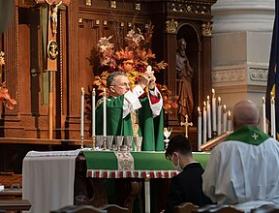This brings us to the important role of silence and solitude. These are not primarily things to achieve as they are ways of preparing ourselves to receive the gifts God has for us. Both are ways of stepping outside our usual patterns of self-preoccupation and distraction. They are ways of making space in the depths of our being. And the clearing of this space is our way of showing hospitality to the God who is already there but who has not been noticed in all the clutter and noise that usually fills that space.
The silence and solitude that are important are, of course, inner—not merely external. Scriptures speak of this as stillness. Think, for example, of the words of Psalm 46:10—"Be still and know that I am God." Inner stillness is a way of communicating our intent to make space for God. Offering whatever inner stillness we have in the moment allows us to be present to the One who is present to us. And it results in a unique form of knowing that the mystics call contemplative knowing.
Contemplative Knowing
Any genuinely transformational knowing of God will always involve more than knowing about God. John of the Cross says that God cannot be thought but can be loved. Even though we will often feel the need to put words to our experience of the Mystery that is God, our words can never hold God. They may point in the general direction of God but that pointing will always be imperfect and limited. And looking at fingers that point toward God should never be confused with the ineffable mystery to which they point. That's the limitation of words and of the mind in the encounter with God.
Knowing God who is love will always involve what the mystics call knowing in love or knowing through love. Love is its own form of knowing. We can be as certain of what we know in or through love as we can of any other form of knowing. In fact, it will usually resonate with things deep in our soul in a way that will confirm the validity of our knowing in ways that go beyond what we can ever experience with intellectual knowing. Some, therefore, speak of bringing our heart, not just our head, to the contemplative encounter. But we shouldn't think of this as making space for feelings but making space for love—God's love, God's life. Contemplation isn't thinking about something or other—even thinking about God. It is making space in our hearts for the touch of the Loving and Living God, and then allowing that touch to flow through the rest of our being—heads included—and out into the world.
For more conversation on the Christian mystics, Christian spirituality, and the sacred journey of transformation, visit the Patheos Book Club on David Benner's new book Spirituality and the Awakening Self.




